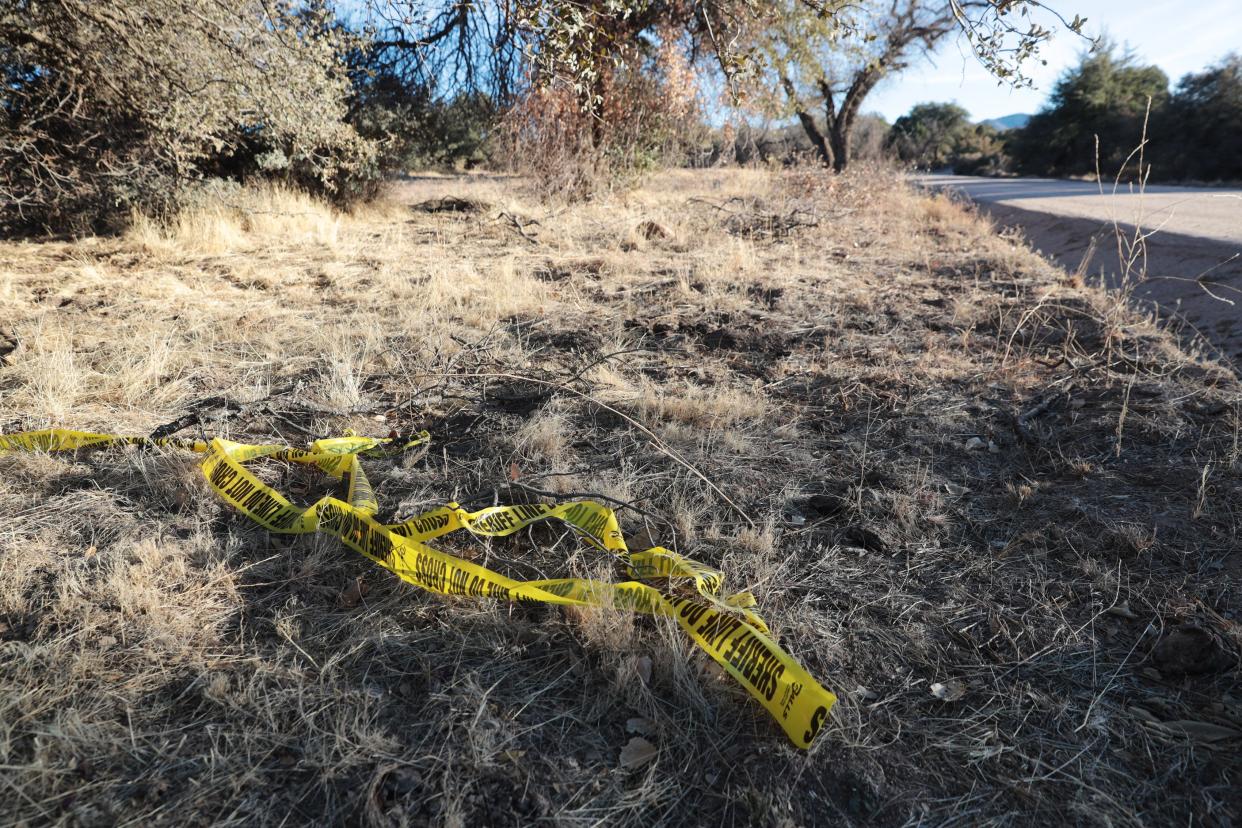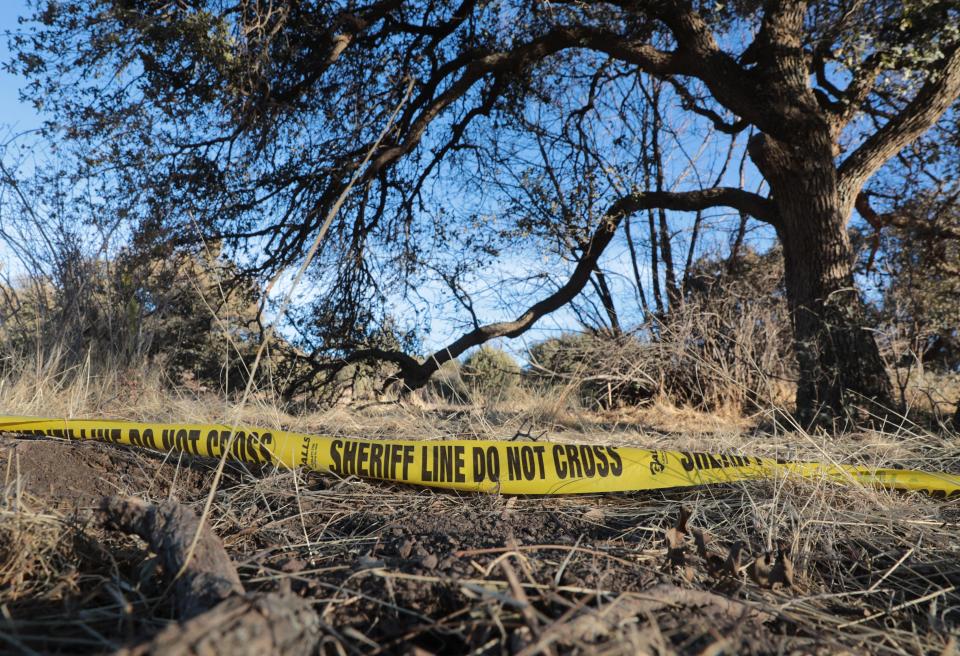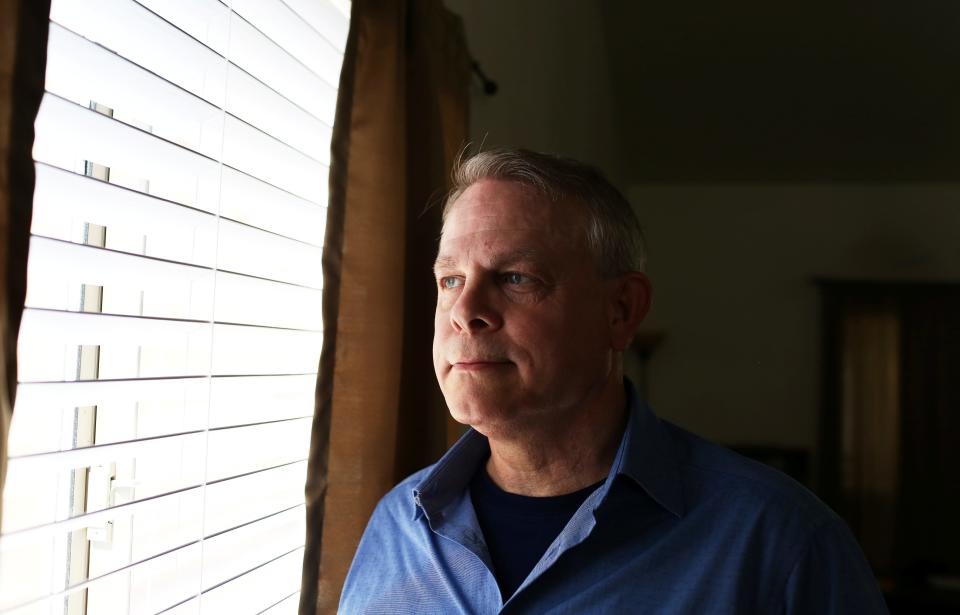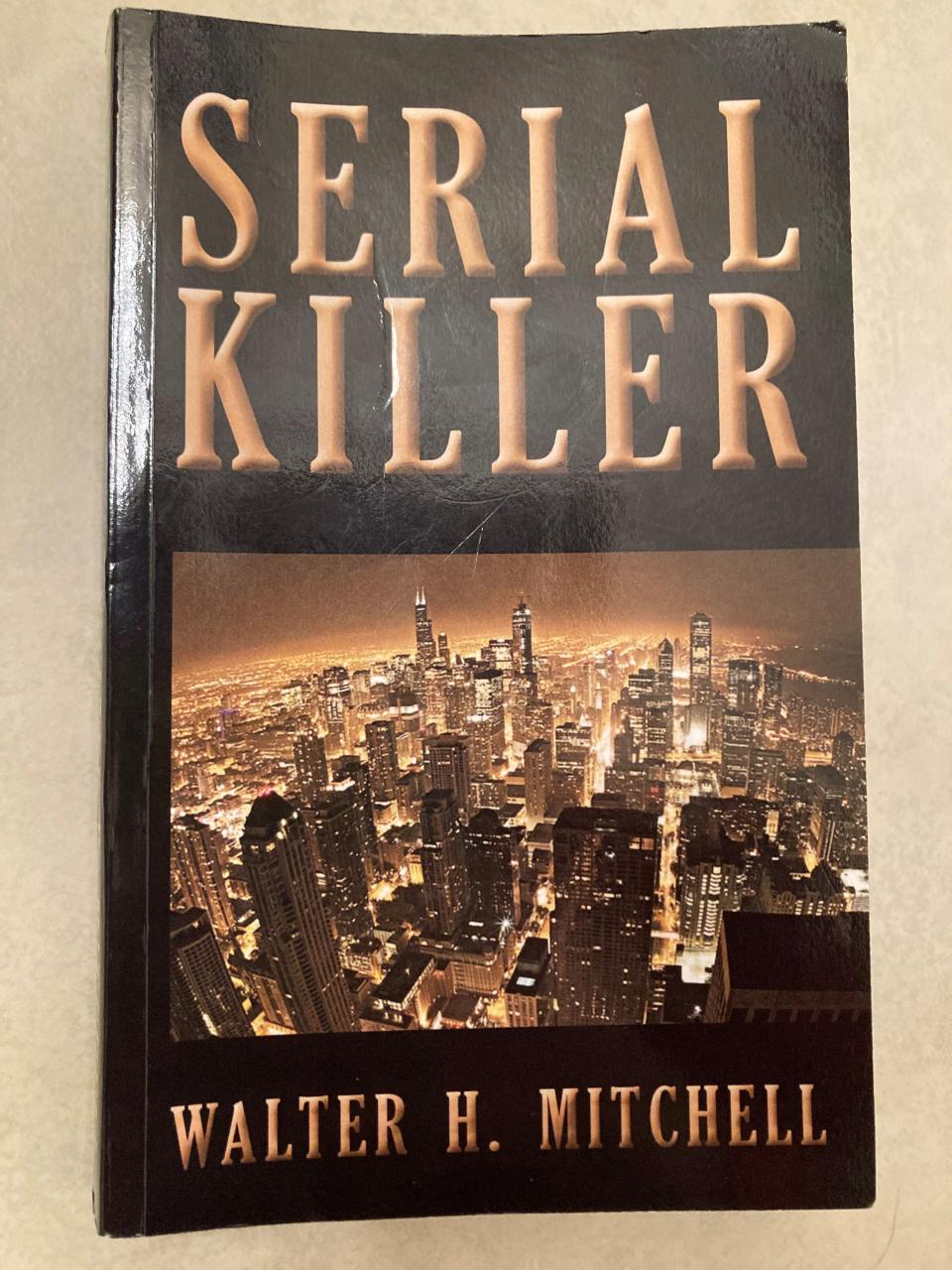Man accused of scattering body parts in Prescott forest fires lawyer, will defend self

A man accused of scattering the body parts of at least nine people in a forest near Prescott fired his defense lawyer Monday, rejected a plea agreement and requested to represent himself at trial.
Yavapai County Superior Court Judge Krista Carman warned Walter Mitchell III of the risks and granted the request. The trial is scheduled to begin Aug. 29.
"I'm a subject matter expert in very few things, but I am a subject matter expert in my case," Mitchell told the judge. "After 16 months, I've decided it's time for a trial. I've wanted a trial from the very beginning. I've been very patient, and I believe I can win."
Mitchell, 60, was arrested in 2020 after investigators said they traced 24 human limbs and five heads found in two remote locations to a company Mitchell owned that sold donated bodies for scientific and medical research. He remains in custody.
He faces a maximum of 22.5 years in prison and financial penalties if found guilty on all 29 Class 5 felony counts of moving, abandoning or concealing dead human body parts. Mitchell has pleaded not guilty.
When sheriff's deputies searched the Scottsdale apartment where Mitchell was living, they found a safe in a bedroom closet containing a pipe bomb, according to court documents.
Mitchell was charged in Maricopa County Superior Court with manufacturing, possessing, transporting, selling or transferring a device with chemicals, a prohibited weapon.
If convicted of the Class 4 felony, Mitchell could be sentenced to a maximum of nearly four years in prison and up to $150,000 in fines. The weapons trial begins May 26.
Remains found before Christmas in Prescott-area forest
In late December 2020, after a hunter alerted authorities to remains near Williamson Valley and Camp Wood roads, Yavapai County deputies say they found two skulls and three buried human heads, an unknown body part, blue and white gauze and medical absorbent pads.
At a second crime scene, near Iron Springs and Contreras roads in the Prescott National Forest, the Sheriff's Office logged two dozen body parts, including legs, arms, feet and knees, in addition to gauze and pads, after a tip from a passerby.

Police traced the remains to Mitchell through metal identification tags attached to the body parts and a plastic bag with his company name left nearby.
Authorities later determined the parts belonged to at least nine individuals.
Mitchell may have been familiar with the sites near Prescott. Public records show he and his parents previously lived in the surrounding area.
A $10K heist and a serial-killer novel
Mitchell had a criminal past, had authored a fictional book about a serial killer and had become a leading figure in the tissue industry before being arrested in 2020.
He told law enforcement during his first arrest in 1993 that he suffered from severe emotional problems that caused him to act impulsively and self-destructively.
He had stolen about $10,000 from a McDonald's where he had been hired using a falsified job application and fled to Mexico, Coconino County Superior Court records show.
He took a train and fled across the border, he admitted. A few days later, he tried to sneak back into the United States but he fell ill, he said, and the Border Patrol arrested him with more than $6,000 in cash.
Mitchell blamed his behavior on despair over his family situation. At 32, he was divorced due to his "mood swings," had a 6-year-old son from his first marriage and a 3-year-old son from a second relationship, and had cycled through at least 40 jobs, he told the court.

In the week before the crime, Mitchell had fought with his ex-wife over his desire to move to Prescott to go back to school and spend more time with his son, he said. The ex-wife and her husband didn't want him living so close, Mitchell said.
"It just seemed like my whole world came crashing down on me," he wrote in a letter to the judge.
Mitchell's depression had a tendency to lead to "self-destructive" behavior when things got tough, Mitchell told law enforcement. Committing the crime was a relief, he said, because it sent him "into a 'panic' mode immediately, which felt better than the depression."
As proof of his emotional challenges, Mitchell submitted to the court a paper his mother, Barbara Mitchell, had written when he was a teenager. She said he had trouble concentrating, struggled with self-control and felt "constant anxiety" along with "a strong urge to release it anyway he can."
"I was scared I had a psychopath on my hands," his mother wrote, noting he was eventually diagnosed with attention deficit hyperactivity disorder.
Sports like football and basketball, which he excelled at, helped him focus, she said.
Mitchell expressed remorse for the theft in a letter to the court and requested to attend therapy. The McDonald's manager asked the judge to sentence Mitchell to community service and counseling instead of jail time because he was a "real decent person."
Mitchell agreed to a plea bargain that dropped his charges to a less serious burglary felony and required him to complete counseling, pay nearly $4,000 in restitution and fees and serve two years of unsupervised probation. He also had to inform employers of the conviction, among other stipulations.
Turning dead bodies into a career
Mitchell had cultivated an interest in medicine and the human body in early adulthood.
He took courses from staffers at the Maricopa County Medical Examiner's Office.
The fascination stuck because, by the time he was 39, Mitchell had helped to found one of Arizona's first body-donation companies, Science Care, he told a reporter, though the company's current CEO was unable to confirm for The Arizona Republic that Mitchell was involved.
Body-donation businesses, instead of providing organs for transplants in living people, make agreements with those preparing for death to sell parts of their corpses to pharmaceutical firms, medical device companies, medical schools and other entities for use in research and development. In exchange for the donation, the unused remains typically are cremated and returned to the family at no cost.
More: How a javelina destroyed a car in its quest for Cheetos in Arizona
Mitchell had links to at least 10 tissue procurement companies in Arizona, California, Illinois, Oregon and Washington from 2000 to 2020.
At least one ran into legal trouble. Biological Resource Center was raided by the FBI and shut down in 2015 for failing to track specimens, screen for diseases such as HIV and store body parts properly. The case gained notoriety for a cooler full of penises that was found.
Public records show that while Mitchell was moving from company to company, he married a second time, purchased a home in Peoria, lost it to foreclosure during the Great Recession and filed for personal bankruptcy in 2010.
A self-published book about a serial killer
In 2012, Mitchell self-published a book called "Serial Killer," which features an Illinois man named Ducky who uses a body-donation company to dispose of victims.

Ducky's first kill is a college student named Sue. He sexually violates her dead body, then cuts her up and mixes her parts with remains from legitimate body donors destined for cremation.
"No funeral director anywhere would open up a two-by-two body box full of tissue, blood, and feces to confirm what they were cremating was actually the body parts of the donor," Ducky explains in the book. "And even if they did, they would find it difficult to confirm the identity of the donor."
"Getting rid of bodies (was) easy" because of spotty industry regulation, the fictional murderer explains. And cremating the body parts made sure evidence went up in a literal puff of smoke.
The body-donation business provides "an excellent cover for his most beloved game ... killing," Ducky says in the book.
Mitchell pointed out in the book's introduction that the tale was made up. But he said he was aiming for realism.
"Names, characters, places and incidents are the product of the author's imagination," he wrote. "However, I wanted to ensure that the events were plausible."
Trouble before arrest
Mitchell opened FutureGenex and Sannex in the Seattle area in 2018, after his second divorce was finalized in Arizona.
Mitchell advertised FutureGenex online as a company that procured donated bodies to further medical education. Sannex offered to ship body parts and surgical tools to medical professionals for hands-on medical training at a cost of $825 to $10,400, according to its website.
In 2019, Mitchell rented space from a funeral home near the Seattle airport where he performed the dissections, according to funeral director Steven Webster. Unused remains went to the funeral home for cremation.
At the border: Ukrainian refugees assemble in Tijuana with eyes on US
The COVID-19 pandemic hurt Mitchell's businesses, causing him to move his operations back home, Webster said.
Mitchell planned to pack specimens of five bodies in dry ice to transport them to Arizona in February 2020 so he could continue his work, Webster said.
It sounded like a reasonable plan, Webster said, especially given Mitchell's experience in the industry.
Mitchell went to live in an RV on someone else's land in Chino Valley, outside Prescott, records show.
He kept a large freezer padlocked inside a shed, deputies discovered.
Then in December 2020, he sold the RV and freezer and moved into a Scottsdale condo his ex-wife had purchased, according to the sheriff's office and public records.
The body parts were found among the hills and brush a week later.
Mitchell was arrested at the condo, which was searched the same day. His ex-wife put it up for sale in January 2021.
Inside the apartment, officers used keys seized during Mitchell's arrest to open the safe and found the pipe bomb, records say.
"The device was a cylindrical object, approximately 8 inches in length, that was capped on both ends and had what appeared to be a fuse," the Yavapai County Sheriff's Office said. "The device was X-rayed on scene and determined to be possibly dangerous."
Officers evacuated nearby apartment units while they removed the object and sent it to a lab for testing, records say.
The Arizona Department of Public Safety determined the device contained an "energetic material," according to authorities.
A "glass vial containing a paper wrap with white string" contained "a red phosphorus and potassium chlorate based pyrotechnic device," the lab results said, according to the probable report. A "glass vial containing gray powder ... contained a single base tubular shaped smokeless powder."
Mitchell did not answer questions about the device, police said.
Michael Daniels, who defended Mitchell until being dismissed on Monday, declined in 2021 to speak with The Republic.
Mitchell has spoken with the newspaper but not yet agreed to an interview about his criminal charges.
Attempts to contact them on Tuesday were unsuccessful.
Contact reporter Rebekah L. Sanders at rsanders@azcentral.com or follow her on Twitter at @RebekahLSanders.
Support local journalism. Subscribe to azcentral.com today
This article originally appeared on Arizona Republic: Trial set for Walter Mitchell, accused of scattering body parts in Arizona

